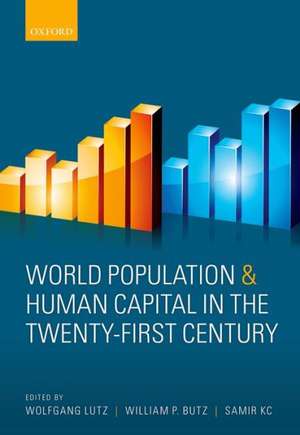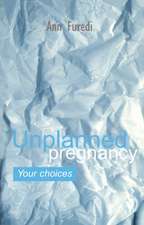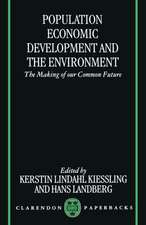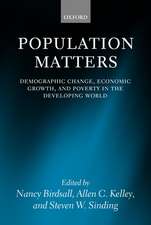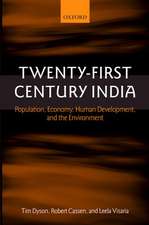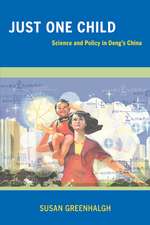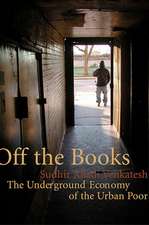World Population and Human Capital in the Twenty-First Century
Editat de Wolfgang Lutz, William P. Butz, Samir KCen Limba Engleză Hardback – 28 aug 2014
Preț: 722.76 lei
Preț vechi: 1019.90 lei
-29% Nou
Puncte Express: 1084
Preț estimativ în valută:
138.30€ • 147.89$ • 115.31£
138.30€ • 147.89$ • 115.31£
Carte tipărită la comandă
Livrare economică 07-14 aprilie
Preluare comenzi: 021 569.72.76
Specificații
ISBN-13: 9780198703167
ISBN-10: 0198703163
Pagini: 1074
Ilustrații: Figures and Tables
Dimensiuni: 186 x 249 x 61 mm
Greutate: 1.75 kg
Editura: OUP OXFORD
Colecția OUP Oxford
Locul publicării:Oxford, United Kingdom
ISBN-10: 0198703163
Pagini: 1074
Ilustrații: Figures and Tables
Dimensiuni: 186 x 249 x 61 mm
Greutate: 1.75 kg
Editura: OUP OXFORD
Colecția OUP Oxford
Locul publicării:Oxford, United Kingdom
Recenzii
provides an excellent summary of the state of the discipline, as it concerns itself with the determinants of fertility, mortality, migration, the changing population composition by education, and the meaning of age.
projections of the educational composition of adult populations is the major achievement of this book. Opinions will vary on whether education should be routinely added to demographic projections but there is no doubting that this contribution of Lutz and colleagues will prove useful in education and manpower planning.
This is a path-breaking book which signals the ever-increasing importance of education to demography, economics and the delivery of equal opportunities and fair outcomes.
This monumental, pioneering volume proselytizes for a new trinity of fundamentals of demography: age, sex, and education. If this book succeeds in its mission, as I hope it will, the future will look different, not only for the science of demography, but also for all people's lives.
This is a valuable guide to data, analysis, and expert opinion bearing on the world's demographic future. Particularly instructive is the consistent focus on the transformative role of educational progress.
This book on human numbers and the quality of lives will deservedly become our first port of call whenever we seek to understand our past and our possible futures. It is simply a monumental piece of work.
projections of the educational composition of adult populations is the major achievement of this book. Opinions will vary on whether education should be routinely added to demographic projections but there is no doubting that this contribution of Lutz and colleagues will prove useful in education and manpower planning.
This is a path-breaking book which signals the ever-increasing importance of education to demography, economics and the delivery of equal opportunities and fair outcomes.
This monumental, pioneering volume proselytizes for a new trinity of fundamentals of demography: age, sex, and education. If this book succeeds in its mission, as I hope it will, the future will look different, not only for the science of demography, but also for all people's lives.
This is a valuable guide to data, analysis, and expert opinion bearing on the world's demographic future. Particularly instructive is the consistent focus on the transformative role of educational progress.
This book on human numbers and the quality of lives will deservedly become our first port of call whenever we seek to understand our past and our possible futures. It is simply a monumental piece of work.
Notă biografică
Wolfgang Lutz is Founding Director of the Wittgenstein Centre for Demography and Global Human Capital, a new collaboration between the International Institute for Applied Systems Analysis (IIASA), the Austrian Academy of Sciences and the WU-Vienna University of Economics and Business. He is director of the Vienna Institute of Demography of the Austrian Academy of Sciences and Professor of Applied Statistics at the WU. He is also Professorial Research Fellow at the Oxford Martin School for 21st Century Studies. He is author of the series of world population projections produced at IIASA and has developed approaches for projecting education and human capital. He is also principal investigator of the Asian MetaCentre for Population and Sustainable Development Analysis. Lutz is author and editor of 28 books and more than 200 refereed articles, including 8 in Science and Nature. In 2008 he received an ERC Advanced Grant, in 2009 the Mattei Dogan Award of the IUSSP, and in 2010 the Wittgenstein Prize.William P. Butz is a Senior Research Scholar with the World Population Program and Director of Coordination and Outreach at the Wittgenstein Centre for Demography and Global Human Capital. Previously he was president and chief executive officer of the Population Reference Bureau. Before joining PRB, he was senior economist at the RAND Corporation; associate director of the US Census Bureau, where he was in charge of household surveys, international activities, and population estimates and projections, and division director for social and behavioral sciences at the National Science Foundation. Mr Butz has taught economic development at UCLA and the University of California at Santa Barbara, served on numerous commissions and boards, and written more than 80 research and policy papers on a variety of topics related to economic demography, nutrition and health, and statistical and science policy. Since 2001, he has served on the Board of Reviewing Editors of Science magazine. Samir KC is Leader of the project 'Modelling Human Capital Formation' at the Wittgenstein Centre for Demography and Global Human Capital, International Institute for Applied Systems Analysis. KC's master's degree in statistics is from Tribhuvan University, Nepal (1997). Subsequently, he taught university statistics in Kathmandu and worked as a biostatistician at the Nepal Health Research Council. KC received his PhD from the University of Groningen, the Netherlands (2009) and has worked as a Research Scholar at the World Population Program at IIASA since 2005. His major research interests are: developing and applying multi-state population models in demographic analysis and projections with a particular focus on modeling human capital formation in education and health; and differential vulnerability to natural disasters. KC has published in Science magazine (2011) and other peer-reviewed journals.
